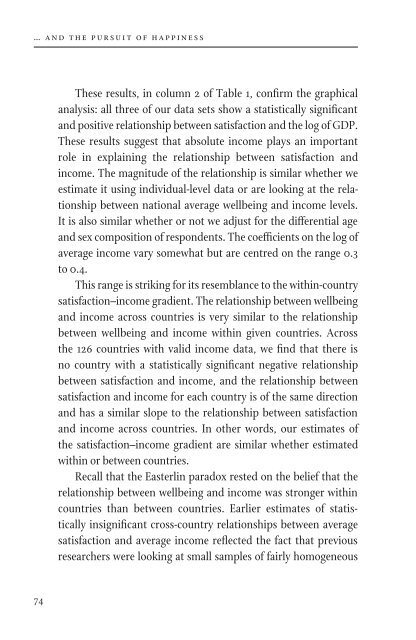… and the Pursuit of Happiness - Institute of Economic Affairs
… and the Pursuit of Happiness - Institute of Economic Affairs
… and the Pursuit of Happiness - Institute of Economic Affairs
Create successful ePaper yourself
Turn your PDF publications into a flip-book with our unique Google optimized e-Paper software.
<strong>…</strong> <strong>and</strong> <strong>the</strong> pursuit <strong>of</strong> happiness<br />
subjective wellbeing<br />
These results, in column 2 <strong>of</strong> Table 1, confirm <strong>the</strong> graphical<br />
analysis: all three <strong>of</strong> our data sets show a statistically significant<br />
<strong>and</strong> positive relationship between satisfaction <strong>and</strong> <strong>the</strong> log <strong>of</strong> GDP.<br />
These results suggest that absolute income plays an im portant<br />
role in explaining <strong>the</strong> relationship between satisfaction <strong>and</strong><br />
income. The magnitude <strong>of</strong> <strong>the</strong> relationship is similar whe<strong>the</strong>r we<br />
estimate it using individual-level data or are looking at <strong>the</strong> relationship<br />
between national average wellbeing <strong>and</strong> income levels.<br />
It is also similar whe<strong>the</strong>r or not we adjust for <strong>the</strong> differential age<br />
<strong>and</strong> sex composition <strong>of</strong> respondents. The coefficients on <strong>the</strong> log <strong>of</strong><br />
average income vary somewhat but are centred on <strong>the</strong> range 0.3<br />
to 0.4.<br />
This range is striking for its resemblance to <strong>the</strong> within-country<br />
satisfaction–income gradient. The relationship between wellbeing<br />
<strong>and</strong> income across countries is very similar to <strong>the</strong> relationship<br />
between wellbeing <strong>and</strong> income within given countries. Across<br />
<strong>the</strong> 126 countries with valid income data, we find that <strong>the</strong>re is<br />
no country with a statistically significant negative relationship<br />
between satisfaction <strong>and</strong> income, <strong>and</strong> <strong>the</strong> relationship between<br />
satisfaction <strong>and</strong> income for each country is <strong>of</strong> <strong>the</strong> same direction<br />
<strong>and</strong> has a similar slope to <strong>the</strong> relationship between satisfaction<br />
<strong>and</strong> income across countries. In o<strong>the</strong>r words, our estimates <strong>of</strong><br />
<strong>the</strong> satisfaction–income gradient are similar whe<strong>the</strong>r estimated<br />
within or between countries.<br />
Recall that <strong>the</strong> Easterlin paradox rested on <strong>the</strong> belief that <strong>the</strong><br />
relationship between wellbeing <strong>and</strong> income was stronger within<br />
countries than between countries. Earlier estimates <strong>of</strong> statistically<br />
insignificant cross-country relationships between average<br />
satisfaction <strong>and</strong> average income reflected <strong>the</strong> fact that previous<br />
researchers were looking at small samples <strong>of</strong> fairly homogeneous<br />
countries. It was <strong>the</strong> juxtaposition <strong>of</strong> this statistically insignificant<br />
finding with evidence <strong>of</strong> a statistically significant wellbeing–income<br />
relationship within countries which led Easterlin<br />
to declare that <strong>the</strong> paradox existed. But <strong>the</strong> historical absence <strong>of</strong><br />
evidence for a proposition – that richer countries are happier – should<br />
not have been confused as being evidence <strong>of</strong> its absence. Indeed, with<br />
our larger data sets, we find statistically significant evidence that<br />
high-income countries are happier than <strong>the</strong>ir low-income counterparts.<br />
In fact, a claim about <strong>the</strong> importance <strong>of</strong> relative income<br />
comparisons should rest upon <strong>the</strong> quantitative magnitudes <strong>of</strong> <strong>the</strong><br />
estimated relationships between wellbeing <strong>and</strong> income. Indeed,<br />
fur<strong>the</strong>r work by Stevenson <strong>and</strong> Wolfers (2010) concludes that<br />
relative income plays at best a minor role in determining life<br />
satisfaction.<br />
An alternative story is based on <strong>the</strong> idea that people adapt to<br />
<strong>the</strong>ir income level. By this view, what matters for satisfaction is<br />
income relative to expectations. Higher income does not make<br />
us happier because we adapt. Fur<strong>the</strong>rmore, variations in income<br />
that have persisted for sufficiently long for expectations to adapt<br />
should <strong>the</strong>refore be unrelated to satisfaction. The differences<br />
in income between countries are lasting. Indeed, across <strong>the</strong> 131<br />
countries in <strong>the</strong> Gallup World Poll, <strong>the</strong> correlation between <strong>the</strong><br />
log GDP per capita in 2006 <strong>and</strong> its value in 1980 is 0.93. If people<br />
adapt to changes in income so that long-lasting changes in income<br />
do not make <strong>the</strong>m happier, persistent cross-country differences in<br />
GDP per capita should have little explanatory power for satisfaction.<br />
The data clearly falsify this hypo<strong>the</strong>sis.<br />
74 75












